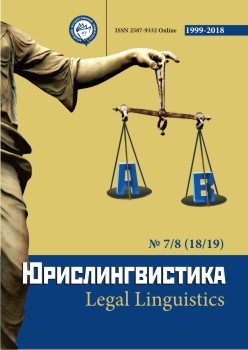DOCUMENTATION OF CRIMES, CAUSED BY SPEECH CONFLICT, IN THE «MILITARY ARTICLES» BY PETER I
Abstract
In the era of Peter I there was a complex process of creating and unifying the terminological paradigm associated with crimes caused by verbal conflicts, the units already existing in the legislation were discarded, the new ones acquire a more unambiguous meaning and did not overlap with each other in the semantic plane, as it had used to be in the previous documents. An important distinction was made between the oral and written forms of insult or defamation, establishing the difference between «mockery» and «insult». The concept of the context of utterance appeared bringing different penalties for similar offenses depending on who and where committed the offense. At the same time, the tendency to expand jurisdiction through church litigation, founded by Tsar Aleksei Mikhailovich in the Decree of 1649 still remained, also the concept of personal, family honor and even honor of the military unit was expanded. «Honor» became one of the most important things for a person, along with property and life.
Downloads
Metrics
References
Анисимов Е. В. Петр Первый. Благо или зло для России? Новое литературное обозрение. 2017.
Баранов А. Н. Лингвистическая экспертиза текста: теория и практика. М., 2012.
Баранов А. Н. Введение в прикладную лингвистику. М., 2012.
Бухтияров А. О. Артикул воинский 1715 г. и Воинский устав 1716 г.: историко-правовая характеристика. Новая наука: Проблемы и перспективы. 2016. № 9–1. С. 137–140.
Голев Н. Д., Воробьева М. Е. Интерпретационное функционирование юридического языка в обыденном сознании. Кемерово, 2017.
Звонов А. В. Система уголовных наказаний по законодательству периода становления абсолютизма в России: аналитический обзор. Вестник Владимирского юридического института. 2016. № 3 (40). С. 158–163.
Ковалев К. С. Деятельность Российского государства по совершенствованию процессуального права в военной сфере в начале XVIII века. Поволжский педагогический поиск. 2016. № 4(18). С. 19–21.
«Памятники русского права». Выпуск восьмой. М., 1961.
Снигирев А. В. Отражение правонарушений, вызванных речевыми конфликтами, в юридических документах периода создания единого Московского государства. Юрислингвистика. 2017. № 6. С. 58–67.
Снигирев А. В. Отражение правонарушений, вызванных речевыми конфликтами, в юридических документах Киевской руси и периода феодальной раздробленности. Юрислингвистика. 2016 № 5. С. 88 95.
Терентьева В. А. Аартикул воинский как источник формирования института освобождения от уголовного наказания. Наука и образование. 2014. С. 259 260.
REFERENCES
Anisimov E. V. Peter the Great. Good or evil for Russia? [Petr Pervyj. Blago ili zlo dlya Rossii?]. New literary review. 2017.
Baranov A. N. Linguistic examination of the text: theory and practice [Lingvisticheskaya ehkspertiza teksta: teoriya i praktika]. Moscow, 2012.
Baranov A. N. Introduction to applied linguistics [Vvedenie v prikladnuyu lingvistiku]. Moscow, 2012.
Bukhtiyarov A. O. Military article 1715 and the Military Charter of 1716: historical and legal characteristics [Artikul voinskij 1715 g. i Voinskij ustav 1716 g.: istoriko-pravovaya harakteristika]. New science: Problems and prospects. 2016. № 9 1. Pp. 137 140.
Golev N. D, Vorobyeva M. E. Interpretational functioning of a legal language in ordinary consciousness [Interpretacionnoe funkcionirovanie yuridicheskogo yazyka v obydennom soznanii]. Kemerovo, 2017.
Zvonov A. V. The system of criminal penalties under the legislation of the period of the formation of absolutism in Russia: an analytical review [Sistema ugolovnyh nakazanij po zakonodatel'stvu perioda stanovleniya absolyutizma v Rossii: analiticheskij obzor]. Bulletin of the Vladimir Law Institute. 2016. № 3 (40). Pp. 158 163.
Kovalev K. S. The activities of the Russian state to improve the procedural law in the military sphere at the beginning of the XVIII century [Deyatel'nost' Rossijskogo gosudarstva po sovershenstvovaniyu processual'nogo prava v voennoj sfere v nachale XVIII veka]. Povolzhsky pedagogical search. 2016. № 4 (18) Pp. 19 21.
«Monuments of Russian Law. Volume eighth» [«Pamyatniki russkogo prava. Vypusk vos'moj»]. Moscow, 1961.
Snigirev A. V. Reflection of offenses caused by speech conflicts in legal documents of the period of the creation of a single Moscow state [Otrazhenie pravonarushenij, vyzvannyh rechevymi konfliktami, v yuridicheskih dokumentah perioda sozdaniya edinogo Moskovskogo gosudarstva]. Jurisinguistics. 2017. № 6. Pp. 58 67.
Snigirev A. V. Reflection of offenses caused by verbal conflicts in legal documents of Kievan Rus and the period of feudal fragmentation [Otrazhenie pravonarushenij, vyzvannyh rechevymi konfliktami, v yuridicheskih dokumentah Kievskoj rusi i perioda feodal'noj razdroblennosti]. Yurislingvistika. 2016. № 5. Pp. 88 95.
Terentyev V. A. Articulated military as a source of formation of the institution of liberation from criminal punishment [Aartikul voinskij kak istochnik formirovaniya instituta osvobozhdeniya ot ugolovnogo nakazaniya. Nauka i obrazovanie]. Science and education. 2014. Pp. 259 260.
Copyright (c) 2018 Юрислингвистика

This work is licensed under a Creative Commons Attribution 4.0 International License.
The authors, which are published in this journal, agree to the following conditions:
1. Authors retain the copyright to the work and transfer to the journal the right of the first publication along with the work, at the same time licensing it under the terms of the Creative Commons Attribution License, which allows others to distribute this work with the obligatory indication of the authorship of this work and a link to the original publication in this journal .
2. The authors retain the right to enter into separate, additional contractual agreements for the non-exclusive distribution of the version of the work published by this journal (for example, to place it in the university depository or to publish it in a book), with reference to the original publication in this journal.
3. Authors are allowed to post their work on the Internet (for example, in a university repository or on their personal website) before and during the review process of this journal, as this may lead to a productive discussion, as well as more links to this published work (See The Effect of Open Access).











